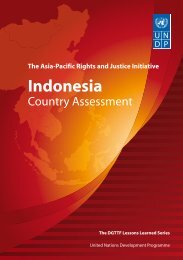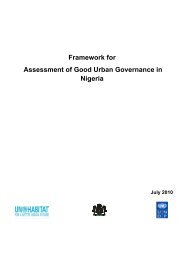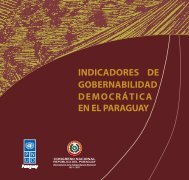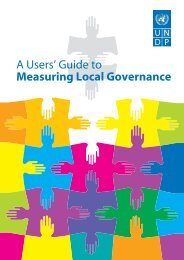English - UNDP
English - UNDP
English - UNDP
You also want an ePaper? Increase the reach of your titles
YUMPU automatically turns print PDFs into web optimized ePapers that Google loves.
Tajikistan Project Assessment<br />
the government’s information systems for planning, monitoring<br />
and evaluation of public policy.<br />
The project began on time and achieved all its planned<br />
objectives. It introduced a unique and innovative approach in<br />
Tajikistan in preparing district development plans. These applied<br />
a participatory approach to identifying strategic priorities and<br />
establishing transparent implementation mechanisms. For the<br />
first time, a monitoring system based on specific local indicators<br />
(aligned with NDS/PRSP indicators) was introduced, and financial<br />
resources for implementation of priorities were identified.<br />
A new mechanism for donor aid coordination was supported<br />
by developing a comprehensive information system, collecting<br />
data from jamoat, district, and national levels on a wide range<br />
of issues.<br />
The project offered a catalytic springboard for a further phase<br />
of the Communities Programme: Building a Framework for Local<br />
Planning and Budgeting. Funding for this came from the DGTTF,<br />
the UK Department for International Development, and the<br />
Canadian International Development Agency.<br />
Partnership between <strong>UNDP</strong> and key national stakeholders<br />
were strengthened further. This is reflected in the cooperation<br />
agreements signed between <strong>UNDP</strong> and the Ministry of Economic<br />
Development and Trade, the Strategic Research Centre, the<br />
Institute for Civil Servants Training, the Ministry of Finance, the<br />
State Statistic Committee, the Ministry of Labour and Social<br />
Protection, and the Parliament.<br />
The DGTTF provided US$150,000 for a third project, Building<br />
a Framework for Local Planning and Budgeting. This<br />
contributed to the development of a comprehensive Programme<br />
of Reform of Tajikistan’s Planning, Budgeting, and Monitoring<br />
and Evaluation Methodology at district and regional levels. It<br />
also worked on a Guidelines and Training Curriculum for the<br />
new methodology, and enhanced the capacities of 220 district<br />
and regional officials to work with the new procedures.<br />
a The project was effective in delivering results through<br />
the Methodology for Planning, Budgeting, and Monitoring<br />
and Evaluation at District and jamoat level, backed up<br />
with a methodological guidelines and a training/mentoring<br />
programme for planning, budgeting, and monitoring<br />
and evaluation.<br />
a The project was implemented efficiently through the existing<br />
structure of the country programme’s head office in<br />
Dushanbe and area offices.<br />
a The project was highly innovative by introducing a new<br />
implementation approach to planning and budgeting in<br />
Tajikistan. This new approach was reflected in the Methodology<br />
for Planning, Budgeting and Monitoring and<br />
Evaluation at district and jamoat levels.<br />
a The project supported the implementation of a new<br />
planning and budgeting practice. For the first time in<br />
Tajikistan, national, (horizontal) and district and jamoats<br />
(vertical) planning and budgeting processes were integrated<br />
and coordinated.<br />
a The catalytic effect was recognized as the project expanded<br />
the scope of the Communities Programme to<br />
public administration.<br />
a The project team was institutionalized in the Ministry<br />
of Economic Development and Trade. The initial DGTTF<br />
project was followed up with a larger <strong>UNDP</strong> project (US$3<br />
million core funding), financed from <strong>UNDP</strong>’s own resources.<br />
Within the framework of this larger project, <strong>UNDP</strong> in<br />
partnership with the Ministry of Economic Development<br />
and Trade, expanded activities throughout the country by<br />
providing technical assistance to the new planning and<br />
budgeting model.<br />
a The engagement of regional authorities and national<br />
actors in introducing a standard participatory planning<br />
methodology was recognized as a key priority for<br />
Tajikistan. The methodology’s sustainability in preparing<br />
district development plans was strongly supported by<br />
national institutions.<br />
a The sustainability of training programmes for strategic<br />
planning, participatory budgeting, poverty mapping, and<br />
monitoring was ensured, as they were adopted by the Institute<br />
for Civil Service Training for its regular curricula for<br />
professional advancement of civil servants.<br />
Key lessons learned<br />
a The Citizens’ Report Cards activities represent an effective<br />
approach to articulating public perceptions of the performance<br />
of public services. However, local authorities<br />
directly concerned with the results of the citizens’ report<br />
cards were not able to bring about change or invest in<br />
service improvement. This activity should, therefore, be<br />
implemented as a part of a broader decentralization<br />
process, which should strengthen both downward and<br />
upward accountability within the governance structures.<br />
a Successful data-collection systems require national lead-<br />
7




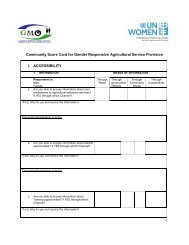

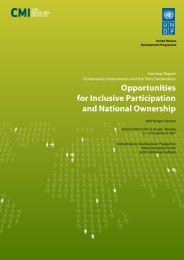
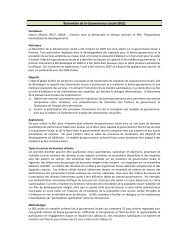
![GuÃa del Usuario ] - Governance Assessment Portal](https://img.yumpu.com/44740603/1/190x253/gua-a-del-usuario-governance-assessment-portal.jpg?quality=85)
